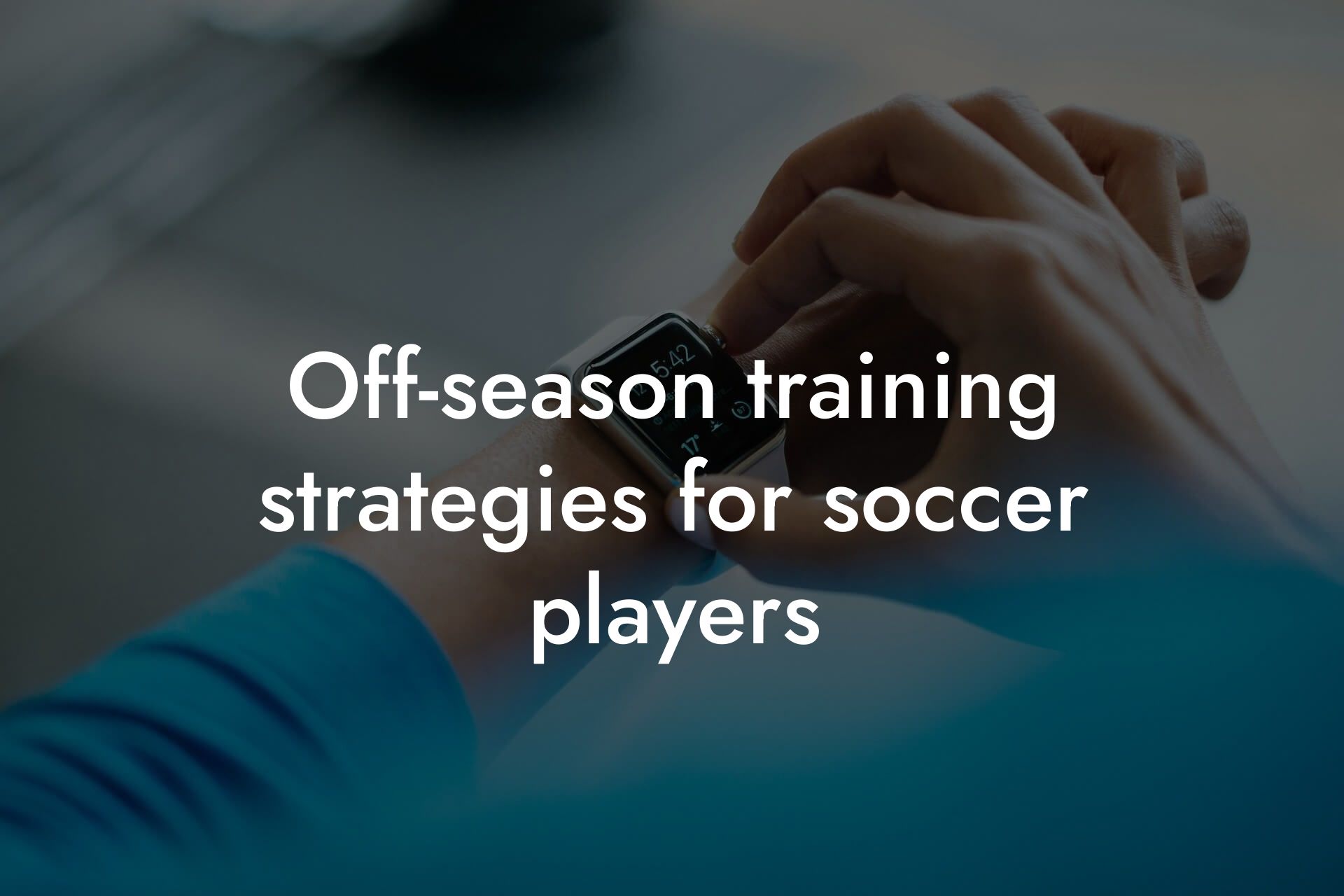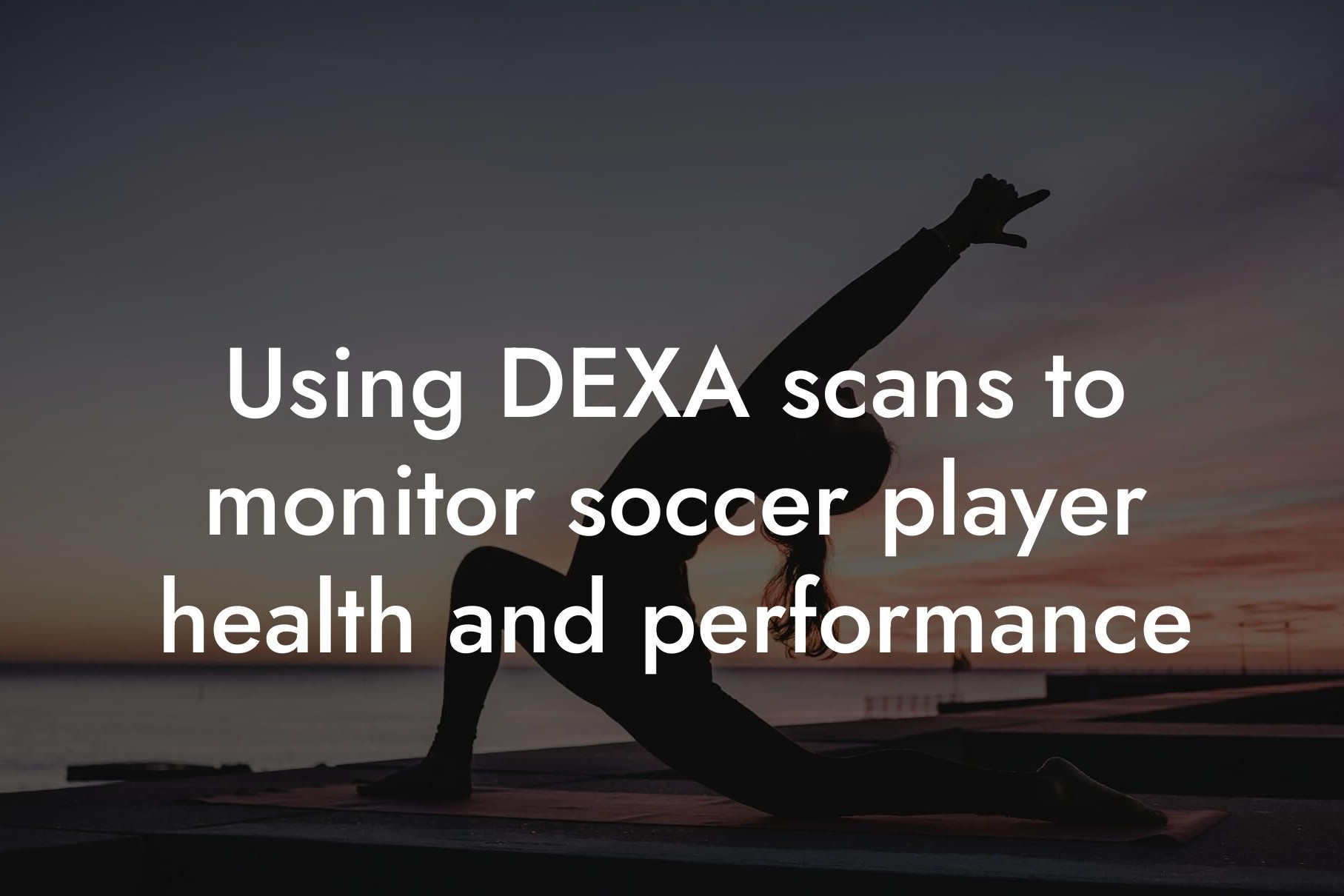As a high-earning professional, you understand the importance of peak physical performance on the soccer field. A well-nourished body is essential to maintaining energy levels throughout the match, and a slight dip in energy can make all the difference between victory and defeat. At Tano Performance Group, we're committed to helping you optimize your physical appearance, body fat, physique, and bone density through our comprehensive DEXA machine assessments. In this article, we'll delve into the essential nutrition tips to help you power through soccer matches with sustained energy and endurance.
Table of Contents
- Pre-Game Meal: The Foundation of Energy
- Hydration: The Key to Optimal Performance
- Electrolytes: The Spark Plugs of Energy
- Carbohydrate Loading: The Energy-Boosting Strategy
- Game-Day Snacks: The Quick Energy Boost
- Post-Game Nutrition: The Recovery Window
- Avoiding Energy-Zapping Foods
- Personalized Nutrition Planning: The Key to Peak Performance
- Frequently Asked Questions
Pre-Game Meal: The Foundation of Energy
A well-planned pre-game meal is crucial in setting the tone for your energy levels during the match. Aim to eat a balanced meal 2-3 hours before kickoff, consisting of complex carbohydrates, lean protein, and healthy fats. This will help to provide sustained energy, support muscle function, and prevent excessive hunger pangs during the game. Good pre-game meal options include whole-grain pasta with turkey meatballs, brown rice with grilled chicken, or oatmeal with banana and almond butter.
Hydration: The Key to Optimal Performance
Adequate hydration is vital for maintaining energy levels and preventing dehydration, which can lead to fatigue, cramping, and decreased performance. Aim to drink at least 16-20 ounces of water 2-3 hours before the game, and continue to sip on water or a sports drink during the match. Additionally, make sure to consume electrolyte-rich foods and drinks, such as bananas, dates, or coconut water, to replenish lost electrolytes.
Electrolytes: The Spark Plugs of Energy
Electrolytes, including sodium, potassium, magnesium, and calcium, play a crucial role in regulating muscle function, nerve impulses, and hydration. During intense physical activity, electrolytes are lost through sweat, leading to muscle cramps, fatigue, and decreased performance. Include electrolyte-rich foods and drinks in your pre-game meal, and consider adding electrolyte supplements or tablets to your water bottle during the match.
Carbohydrate Loading: The Energy-Boosting Strategy
Carbohydrate loading is a popular strategy among athletes to maximize energy stores before competition. By consuming a high-carbohydrate diet 1-3 days before the match, you can increase your muscle glycogen stores, providing a readily available energy source during the game. Focus on complex carbohydrates, such as whole grains, fruits, and vegetables, and avoid simple sugars and refined carbohydrates.
Game-Day Snacks: The Quick Energy Boost
During the match, it's essential to refuel with quick-digesting carbohydrates and electrolytes to maintain energy levels. Opt for game-day snacks like energy bars, dried fruits, or energy chews, which are easy to consume and provide a rapid energy boost. Avoid heavy meals or snacks high in fat, protein, or fiber, which can cause digestive discomfort and decreased performance.
Post-Game Nutrition: The Recovery Window
The 30-60 minute window after the match is critical for recovery and replenishing energy stores. Consume a mix of carbohydrates and protein within 30 minutes of the game, such as a protein shake with fruit or a meal with lean protein and complex carbohydrates. This will help to promote muscle recovery, reduce muscle soreness, and replenish energy stores for the next match.
Avoiding Energy-Zapping Foods
Certain foods can have a negative impact on energy levels, leading to fatigue, bloating, and decreased performance. Avoid or limit foods high in sugar, salt, and unhealthy fats, such as processed snacks, fried foods, and sugary drinks. Additionally, be cautious of foods that can cause digestive discomfort, such as beans, cabbage, or broccoli, which can lead to decreased energy and performance.
Personalized Nutrition Planning: The Key to Peak Performance
Every athlete is unique, with individual nutritional needs and preferences. At Tano Performance Group, we understand the importance of personalized nutrition planning in achieving peak physical performance. Our comprehensive DEXA machine assessments provide a detailed analysis of your body composition, allowing us to create a tailored nutrition plan that meets your specific needs and goals. By combining our expertise with your dedication, we can help you unlock your full potential on the soccer field.
Frequently Asked Questions
What are the most important nutrients for maintaining energy levels during soccer matches?
As a soccer player, it's crucial to fuel your body with the right nutrients to maintain energy levels throughout the match. The most important nutrients for energy production are carbohydrates, protein, and healthy fats. Carbohydrates provide energy for your muscles, while protein helps to repair and rebuild muscle tissue. Healthy fats, such as omega-3 fatty acids, support heart health and reduce inflammation.
How can I ensure I'm getting enough carbohydrates during a soccer match?
To ensure you're getting enough carbohydrates during a soccer match, focus on consuming complex carbohydrates such as whole grains, fruits, and vegetables in the hours leading up to the game. You can also consume sports drinks or energy gels that contain carbohydrates during the match to provide an quick energy boost.
What is the best way to stay hydrated during a soccer match?
Staying hydrated is crucial during a soccer match to prevent dehydration and maintain energy levels. Aim to drink at least 16-20 ounces of water or a sports drink 1-2 hours before the game, and continue to drink small amounts throughout the match. You can also monitor your urine output to ensure you're staying hydrated - if your urine is dark yellow or you're not urinating frequently enough, it may be a sign that you need to drink more.
What are some healthy snack options to consume during a soccer match?
Healthy snack options to consume during a soccer match include fruits, energy bars, and trail mix. Look for snacks that are high in carbohydrates and low in added sugars, salt, and unhealthy fats. Avoid consuming heavy meals or greasy foods that can cause digestive discomfort during the match.
How can I prevent muscle cramps during a soccer match?
Muscle cramps can be a common issue during soccer matches, especially in hot and humid weather. To prevent muscle cramps, make sure to stay hydrated by drinking plenty of water or a sports drink, and consume electrolyte-rich foods such as bananas or avocados. You can also consider taking an electrolyte supplement or consuming a sports drink that contains electrolytes.
What is the best way to recover after a soccer match?
Recovery is a critical component of maintaining energy levels during soccer matches. After the match, focus on consuming a balanced meal that includes carbohydrates, protein, and healthy fats within 30-60 minutes. You can also consider consuming a post-workout recovery drink that contains protein and carbohydrates. Additionally, make sure to stretch and foam roll to reduce muscle soreness and improve flexibility.
How can I maintain energy levels during a long soccer tournament?
Maintaining energy levels during a long soccer tournament requires careful planning and attention to nutrition. Focus on consuming a balanced diet that includes plenty of complex carbohydrates, lean protein, and healthy fats. Stay hydrated by drinking plenty of water or a sports drink, and consider consuming electrolyte-rich foods or supplements to prevent dehydration and muscle cramps.
What are some common energy-boosting foods to consume during a soccer match?
Some common energy-boosting foods to consume during a soccer match include dates, energy bars, and dried fruits. These foods are high in natural sugars and provide a quick energy boost. You can also consider consuming caffeine-containing foods such as energy drinks or chocolate, but be careful not to overconsume as it can lead to energy crashes and digestive discomfort.
How can I prevent energy crashes during a soccer match?
Energy crashes can be a common issue during soccer matches, especially if you're not fueling your body properly. To prevent energy crashes, focus on consuming a balanced diet that includes complex carbohydrates, lean protein, and healthy fats. Stay hydrated by drinking plenty of water or a sports drink, and avoid consuming high-sugar foods or drinks that can cause energy crashes.
What is the role of protein in maintaining energy levels during soccer matches?
Protein plays a critical role in maintaining energy levels during soccer matches by helping to repair and rebuild muscle tissue. Aim to consume 15-20 grams of protein within 30-60 minutes after the match to support muscle recovery. You can also consider consuming protein-rich foods such as nuts, seeds, or energy bars during the match to provide an energy boost.
How can I maintain energy levels during a soccer match in hot and humid weather?
Maintaining energy levels during a soccer match in hot and humid weather requires careful attention to hydration and electrolyte intake. Make sure to drink plenty of water or a sports drink to stay hydrated, and consider consuming electrolyte-rich foods or supplements to prevent dehydration and muscle cramps.
What are some common mistakes soccer players make when it comes to nutrition during matches?
Some common mistakes soccer players make when it comes to nutrition during matches include not consuming enough carbohydrates, not staying hydrated, and consuming high-sugar foods or drinks that can cause energy crashes. Additionally, not consuming a balanced meal or snack during the match can lead to energy crashes and decreased performance.
How can I customize my nutrition plan to meet my individual energy needs during soccer matches?
To customize your nutrition plan to meet your individual energy needs during soccer matches, consider working with a sports dietitian or nutritionist who can help you develop a personalized plan based on your specific energy needs and goals. You can also experiment with different foods and drinks during training sessions to see what works best for you.
What is the role of caffeine in maintaining energy levels during soccer matches?
Caffeine can be a helpful tool in maintaining energy levels during soccer matches, but it should be consumed in moderation. Aim to consume 100-200mg of caffeine, or about 1-2 cups of coffee, 30-60 minutes before the match to provide an energy boost. However, be careful not to overconsume as it can lead to energy crashes, jitters, and digestive discomfort.
How can I stay energized during a soccer match if I have a sensitive stomach?
If you have a sensitive stomach, it's important to focus on consuming foods and drinks that are easy to digest during a soccer match. Avoid consuming heavy meals or greasy foods that can cause digestive discomfort, and opt for light, easy-to-digest snacks such as fruits, energy bars, or trail mix.
What are some natural energy-boosting supplements to consider during soccer matches?
Some natural energy-boosting supplements to consider during soccer matches include beetroot juice, ginseng, and guarana. These supplements can provide a natural energy boost and improve endurance, but be sure to consult with a healthcare professional before adding any new supplements to your routine.
How can I maintain energy levels during a soccer match if I'm a vegetarian or vegan?
Maintaining energy levels during a soccer match as a vegetarian or vegan requires careful attention to nutrition. Focus on consuming plant-based sources of protein such as beans, lentils, and tofu, and make sure to consume plenty of complex carbohydrates such as whole grains, fruits, and vegetables. You can also consider consuming plant-based energy bars or supplements to provide an energy boost.
What is the best way to consume electrolytes during a soccer match?
The best way to consume electrolytes during a soccer match is through a sports drink or electrolyte-rich foods such as bananas, avocados, or coconut water. You can also consider taking an electrolyte supplement, but be sure to follow the recommended dosage to avoid overconsumption.
How can I prevent dehydration during a soccer match?
Preventing dehydration during a soccer match requires careful attention to hydration. Make sure to drink plenty of water or a sports drink before, during, and after the match, and monitor your urine output to ensure you're staying hydrated. You can also consider consuming electrolyte-rich foods or supplements to help prevent dehydration.
What are some common signs of dehydration during a soccer match?
Some common signs of dehydration during a soccer match include dark yellow or brown urine, decreased urine output, dry mouth, and dizziness or lightheadedness. If you experience any of these symptoms, make sure to drink plenty of water or a sports drink to rehydrate.
How can I maintain energy levels during a soccer match if I have a busy schedule?
Maintaining energy levels during a soccer match with a busy schedule requires careful planning and attention to nutrition. Focus on consuming quick and easy-to-digest snacks such as energy bars, fruits, or trail mix, and make sure to stay hydrated by drinking plenty of water or a sports drink. You can also consider meal prepping or working with a sports dietitian to develop a personalized nutrition plan.
What is the role of omega-3 fatty acids in maintaining energy levels during soccer matches?
Omega-3 fatty acids play a critical role in maintaining energy levels during soccer matches by reducing inflammation and supporting heart health. Aim to consume foods rich in omega-3 fatty acids such as salmon, walnuts, or chia seeds, or consider taking an omega-3 supplement to support energy production.
Here are some related articles you might love...
- Off-season training strategies for soccer players
- Using DEXA scans to monitor soccer player health and performance
- The role of bone density in preventing soccer injuries
- Reducing body fat to enhance soccer agility
- Balancing endurance and strength in soccer
- Hydration and recovery tips for soccer athletes
- How body composition affects speed and stamina in soccer
- Maintaining lean muscle mass for optimal soccer performance
- Strength and conditioning programs for soccer players
Zak Faulkner
Zak Faulkner is a leading authority in the realm of physical health and body composition analysis, with over 15 years of experience helping professionals optimise their fitness and well-being. As one the experts behind Tano Performance Group, Zak has dedicated his career to providing in-depth, science-backed insights that empower clients to elevate their physical performance and overall health.
With extensive knowledge of DEXA technology, Zak specializes in delivering comprehensive body assessments that offer precise data on body fat, muscle mass, bone density, and overall physique. His expertise enables individuals to make informed decisions and achieve their fitness goals with accuracy and confidence. Zak’s approach is rooted in a deep understanding of human physiology, combined with a passion for helping clients unlock their full potential through personalised strategies.
Over the years, Zak has earned a reputation for his commitment to excellence, precision, and client-focused service. His guidance is trusted by top professionals who demand the best when it comes to their health. Whether advising on fitness programs, nutritional strategies, or long-term wellness plans, Zak Faulkner’s insights are a valuable resource for anyone serious about taking their health and fitness to the next level.
At Tano Performance Group, Zak continues to lead our Content Team revolutionising how professionals approach their physical health, offering unparalleled expertise that drives real results.




